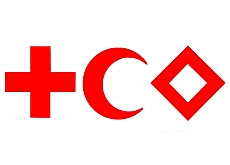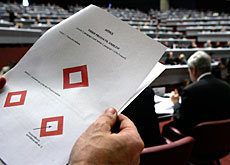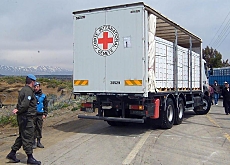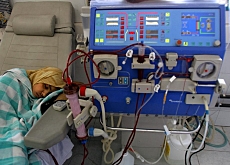Red Crystal accord is only partial success

A former diplomat tells swissinfo the lack of consensus to extend Red Cross membership to Israel and the Palestinian Authority will not strengthen the movement.
Nonetheless, Yves Besson says the accord to bring not only Israeli but Palestinian relief agencies into the humanitarian fold should improve cooperation between the two sides.
The agreement, reached on Thursday in Geneva, also paves the way for a third symbol, a red crystal, to be integrated into the humanitarian movement, the International Federation of Red Cross and Red Crescent Societies.
It puts an end to Israel’s nearly 60-year struggle for accession.
But Besson, a Middle East expert, says the fact that the accord was reached by vote (237 states and societies voted in favour, 54 voted against, and 18 abstained), and not consensus could lead to repercussions.
swissinfo: Has the whole exercise been a failure?
Yves Besson: Partly. The Red Cross and Red Crescent movement usually takes decisions based on consensus. That’s necessary since we are dealing here with humanitarian issues; the need to helps victims or war or natural disaster.
swissinfo: Are the hostilities in the Middle East responsible for this “partial” failure?
Y.B.: In the history of the Arab-Israeli conflict, there have been several occasions which were favourable for moving ahead with negotiations. That was the case during the preparatory meetings but not this week since there has been a renewal of tension between the two sides.
And Syria used the occasion to recall that the Golan Heights is still occupied by Israel.
Everyone attending these kinds of meetings says that the interest of the victims should take precedence over everything else, but politics is omnipresent.
swissinfo: What will be the accord’s impact?
Y B: This agreement does not mean from now on there will be no more difficulties on the ground. There will be many cases where Palestinian ambulances will still be blocked at Israeli checkpoints, hindering the transportation of the wounded.
Relief agencies may strike an agreement with the Israeli authorities and still find their work blocked. It will be up to the International Committee of the Red Cross to solve these kinds of disagreements and ensure the implementation of the accord.
swissinfo: Why do these problems still exist? Is it because there are no recognised borders dividing the two sides?
Y.B.: That certainly plays a part, as does the fact that Palestine is not a sovereign state, which Israel is. Therefore diplomatically, legally and concretely, Israel is in a position of strength.
swissinfo: That said, the two relief agencies have been cooperating for many years.
Y.B.: Yes. This cooperation relies on the goodwill of individuals. That’s one reason why Thursday’s accord is a good one since it broadens the scope for manoeuvre for these individuals on both sides.
swissinfo: Could this agreement pave the way for cooperation in other areas between Israelis and Palestinians?
Y.B.: It could be compared to the table tennis match between China and the United States in 1971. The sporting competition preceded the reestablishment of diplomatic ties between the two powers.
However, the Geneva Conventions state that the occupying force is responsible for public health in the territories under its control, even if Israeli ambulances never circulate in these areas. But the Jewish state has an interest to ensure that there is a Palestinian body safeguarding public health.
At the very least, this agreement is a success for the Red Cross and the Red Crescent Societies since it regulates a dispute going back half a century.
swissinfo interview: Frédéric Burnand in Geneva
The red cross emblem, which was officially approved in 1864, is based on the Swiss flag with the colours reversed.
The red crescent was adopted during the war between Russia and the Ottoman Empire (1876-1878). It is based on the Turkish flag, with the colours switched.
Some countries, such as Israel, have found it difficult to use either of the emblems. Hence the move to adopt an additional symbol that is free of any national, cultural, religious, political or ethnic connotations.

In compliance with the JTI standards
More: SWI swissinfo.ch certified by the Journalism Trust Initiative




You can find an overview of ongoing debates with our journalists here. Please join us!
If you want to start a conversation about a topic raised in this article or want to report factual errors, email us at english@swissinfo.ch.